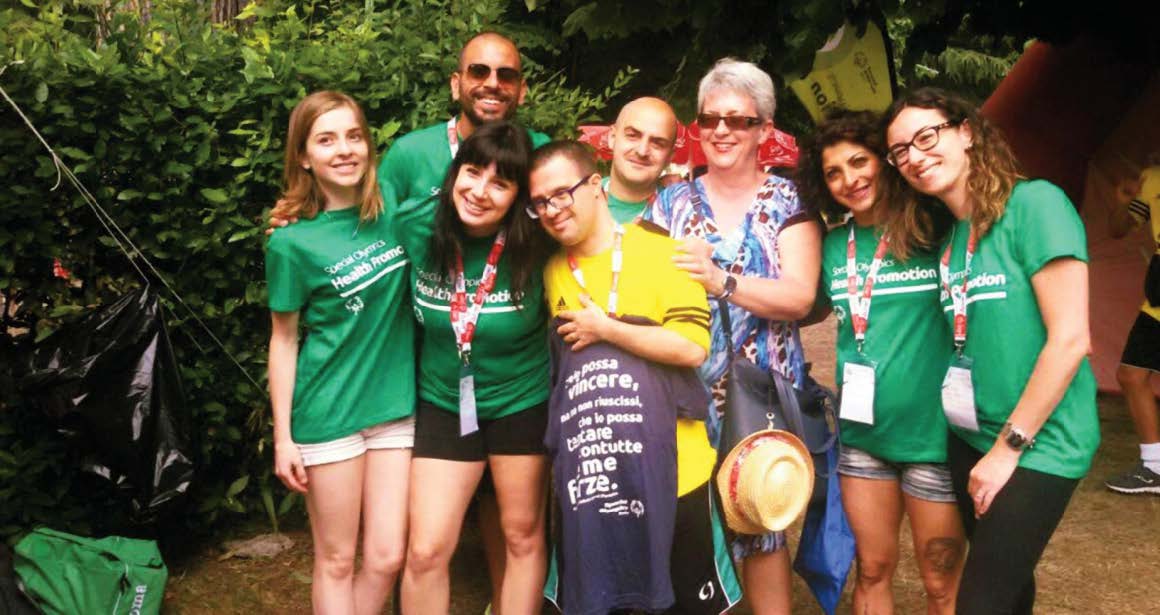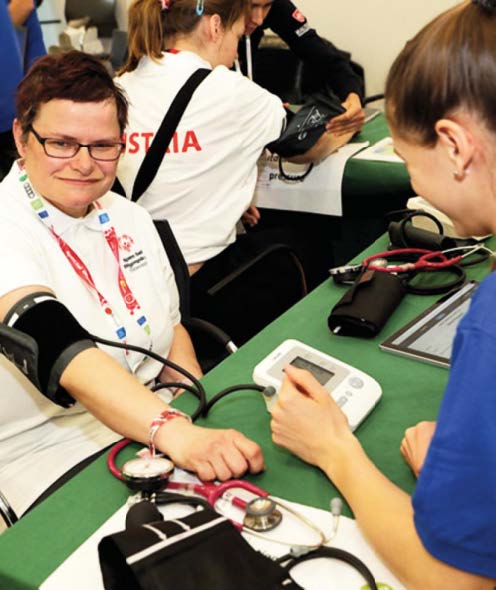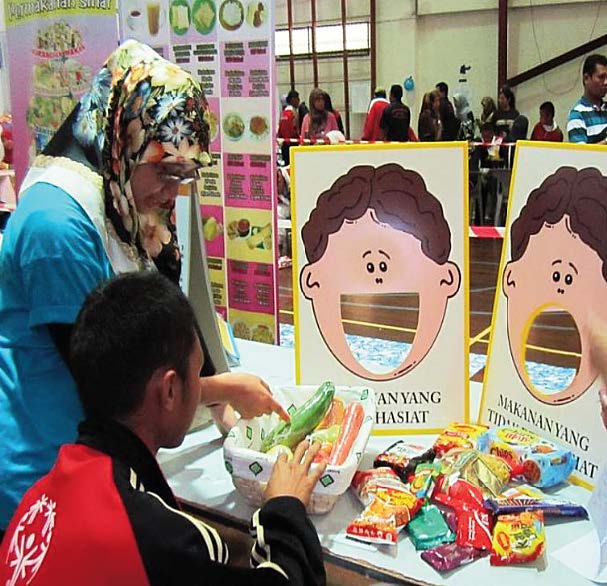
In recent years, Health Promotion has been spreading outside the screening "tent" and to the field of play and community with Special Olympics Athletes serving as health leaders.
Like any athlete, Special Olympics athletes who are fit, at a healthy weight, have strong bone density and normal blood pressure are better able to compete in their sport, contribute at work and enjoy activities in their daily lives. But people with intellectual disabilities (ID) have higher rates of obesity, bone fractures and untreated hypertension (high blood pressure), leading to chronic disease and, for many, a shorter life expectancy. One of the largest discrepancies between individuals with ID and the general population exists in obesity. In Special Olympics athletes, 31% of the adult population globally were obese (BMI ≥30) as compared to 13% of the general population. In the United States, the rates are even higher—45.8% of US Special Olympics athletes were obese in comparison to 30.4% of the general US adult population.
Since 2003, Special Olympics has offered Health Promotion events to help combat this disparity by providing free screening to Special Olympics athletes, as well as training healthcare providers in how to provide care and resources to individuals with ID in their own clinics and communities. "Special Olympics Health Promotion changes lives around the world by delivery of interactive, and fun education activities that promote healthy behaviors and provides opportunities for athletes to learn about and practice behaviors that enhance their health and prevent chronic disease," said Mary Pittaway, a registered Dietitian and Special Olympics Global Clinical Advisor for Health Promotion.
In Health Promotion events around the world, volunteer physicians, nurses, nutritionists and health educators provide clinical screenings in four key areas: (1) bone density (for athletes age 20+), (2) blood pressure, (3) Body Mass Index (BMI), and (4) a selfreport survey on current health habits. Based on the screening results and the athletes' needs, volunteers also provide critical education in areas such as nutrition, sun safety, and tobacco cessation to convey and reinforce key concepts on healthy living, healthy lifestyle choices, and locally specific health issues.
Special Olympics health programming works to address wellness and health promotion across the continuum – from the individual athlete to the family who supports them, and the community they live in, to the health system. At a Health Promotion screen ing, the focus is the athlete themselves. "We teach athletes behaviors they can do for themselves, rather than having to depend on others. Athletes are empowered to choose healthier foods and beverages. They are taught how to protect themselves from getting sunburn, while still getting enough vitamin D. They are shown ways to add physical activity into their daily lives, outside of their sports time. They learn to protect themselves from communicable diseases by practicing good handwashing," explains Pittaway.


LEADING THE CHARGE: (Above left) Renate Nekolar from Austria gets her blood pressure checked. (Above right) An athlete in Indonesia learns the difference between healthy and unhealthy foods. (Opposite page) Gabriele, center in yellow, has lost over 22 pounds after being motivated to get healthier after attending Health Promotion.
"Often, athletes share that the nutrition information they receive at Health Promotion, such as drinking more water and less sugar-sweetened beverages, has helped them to achieve a healthy weight and improve their sport performance. We talk about small changes to enhance the athlete's health and sports enjoyment," shared Alice Lenihan, a registered dietitian and Special Olympics Global Clinical Advisor for Health Promotion. The athletes are eager to learn and apply the knowledge they gain from Health Promotion.
At a 2014 Health Promotion event in Italy, Gabriele, a Special Olympics soccer athlete, spoke with Health Promotion Clinical Director and Nutritionist, Roberto Vennarucci. They discussed how Gabriele might be able to run faster and meet his athletic goals if he improved his nutrition and healthy habits. Roberto recalled that Gabriele's mother explained, "no matter how hard she tried, Gabriele didn't seem to care about what he ate." However, after attending the Health Promotion event, Gabriele decided to track his weight, control the amount of salt and seasoning in his cooking, and replace sugary beverages with water. Within several months he had already lost 22 pounds. Even better, he maintained that weight loss for more than a year when he reconnected with Roberto and the volunteers who first inspired him to work toward this health goal at another Health Promotion event.
In recent years, Health Promotion has been spreading outside the screening "tent" and to the field of play and community with Special Olympics Athletes serving as health leaders. Athletes are leading "sun safety squads," passing out sunscreen and providing sun safety education to their fellow athletes and fans in the stands; they are leading cooking demonstrations at community events; and they are speaking to legislators and industry leaders. Through their actions, and with support from Special Olympics, these athletes are leading the charge to create inclusive communities that are improving the health not only of themselves and their fellow athletes, but having a ripple effect on their families and communities and inspiring us all to make our own behavior change and healthy lifestyle decisions. •
Learn more about Special Olympics, Healthy Athletes and Health Promotion and wellness programming at specialolympics.org/health
ABOUT THE AUTHOR: Peyton Purcell, MPH is Senior Manager of Health Promotion and MedFest, Special Olympics International.

EP MAGAZINE EDITORS' NOTE:
Fans, athletes, coaches, families and supporters of Special Olympics can qualify for a free yearly digital subscription to EP Magazine by contacting us. Please click on: ep-magazine.com/so.php